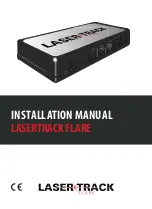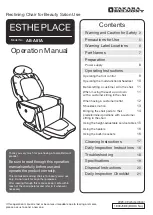
-2-
PKI-0037-4
● In order for the lamp to perform at its full potential, use the relay harnesses manufactured by PIAA.
● All work procedures should be carried out in a location with adequate space. Place the shift lever in neutral or in the parking
position. Turn off the engine and set the parking brake.
● Make sure the engine compartment is adequately cool before starting work. Do not begin work if engine parts such as radiator,
oil-cooler or turbo parts are still hot.
● Do not add additional holes to the main body of the lamp. Also, do not apply adhesives or stickers to the lamp parts.
● Do not modify the lamp harness or the switch harness in any way. Such modifi cations may cause it to overheat or short. In some
cases, it may cause the vehicle to catch fi re. PIAA will not be liable for damage caused by such modifi cations.
● When removing the battery terminals, do not touch the (-) and (+) terminals simultaneously. An electrical shock may occur.
Wear rubber gloves when carrying out such work procedures.
● Make sure the (-) and (+) terminals do not make contact with metal. It can be extremely dangerous if a short occurs.
● Make sure all bolts are tightly secure. If there are any loose bolts tighten them accordingly.
● After installing the lamp, adjust the lamp so the beam shines at least 40m in front of the vehicle. Also, adjust the lamp a little
toward the left so that it does not shine directly into the eyes of the opposing driver of a vehicle. (as traffi c laws stipulate -
refer to p.6 for adjustment procedures)
● After installing the lamp, make sure the headlamps, wipers and horn are working normally.
● When the battery terminal is removed, memory related to the clock, radio, audio system etc, will be aff ected. After all work
procedures are completed, reset to the original settings. (For adjustment procedures refer to your car's instruction manual)
Please read the installation procedures thoroughly beforehand.
● Before you begin always remove the (-) and (+) terminals.
Always remove the (-) terminal fi rst and make sure a short does not occur.
● When removing the battery terminals, always turn the key to OFF and remove it. Turn all other electrical units off such as
the light switch.
● When removing the battery terminals, if a cord (for an electrical unit) is connected, wind a length of vinyl tape around the
(-) and (+) terminals to clearly identify them.
● Verify the (+) terminal (white) and earth (black) before connecting.
● Do not obtain (+) voltage from the alternator.
● Obtain the (+) current necessary for the switch from the (+) current used for the light switch.
(Do not use the same current used for a computer, radio or audio system)
● Install the switch harness in a position where it will not make contact with high temperature surfaces such as the engine,
radiator or engine compartment.
● Arrange the switch harness so that it does not make contact with moving parts.
● Do not place the switch harness on high-voltage wires such as brake or air-conditioning wires.
● If the switch harness makes contact with a part of the engine, apply a length of ordinary cushioned tape around the harness.
● When connecting the connector, insert until you hear an audible click
● When removing the connector, hold the main body of the connector and pull it out. If excess force is used to pull the cord, it
may damage the connection, which could cause it to overheat.
● Make sure the harness does not sag. Use a harness band of vinyl tape to secure it in place to wiring inside the engine compartment.
● Before connecting it to the battery, verify the wiring arrangement.
● When connecting the battery terminal and or other electrical units, do not mistake the (-) and (+) terminals. Always start with
the (+) terminal.
● After all wiring is complete, confi rm that it works properly. If it fails to activate, refer to 【4】Troubleshooting section
of this manual.
● When installing the wiring harness, strictly follow the cautionary points mentioned below. Incorrect or faulty wiring may cause
the lamp to operate improperly. In some cases, it may cause the vehicle to catch fi re.
Caution Regarding Wiring / Please read thoroughly


























